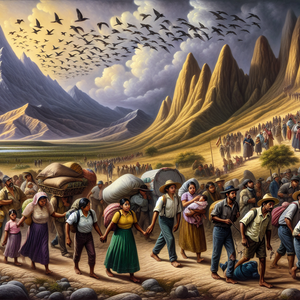The Power Broker Behind the Supreme Court: Leonard Leo's Influence on the Judiciary

Leonard Leo's journey began in the hallowed halls of legal academia, but it was his keen understanding of the intersection between law and politics that set him apart. After obtaining his law degree from the University of Chicago, Leo honed his skills at the Federalist Society, a group dedicated to promoting conservative legal principles. His early advocacy for originalism and textualism resonated with a network of like-minded individuals and organizations, positioning him as a trusted advisor and strategist for a movement seeking to reclaim the judiciary. Leo's influence became particularly apparent during the Supreme Court nominations of Justices Neil Gorsuch and Brett Kavanaugh. As a leading figure in the selection process, he worked tirelessly to ensure that candidates aligned with conservative values were put forward. His ability to cultivate relationships with key stakeholders, including the White House and Republican senators, allowed him to navigate the complex political landscape with remarkable effectiveness. Leo’s role in these nominations highlighted his skill in balancing legal, political, and public relations strategies to achieve his goals.
Strategic Fundraising and Political Connections
Central to Leo's power is his exceptional talent for fundraising. Over the years, he has orchestrated significant financial support for conservative judicial candidates and related initiatives. Organizations such as the Judicial Crisis Network (JCN), which Leo co-founded, have been pivotal in mobilizing resources for judicial confirmations. In 2018, the JCN reportedly spent more than $10 million to support Kavanaugh's confirmation, showcasing Leo's capacity to leverage financial resources for political gain. Leo's connections extend beyond traditional political circles. He has cultivated relationships with mega-donors and influential figures in the conservative movement, creating a formidable network that allows him to exert pressure and influence at the highest levels. Notable benefactors, including the Koch brothers and other wealthy conservatives, have supported Leo’s initiatives, amplifying his voice in the ongoing dialogue surrounding judicial appointments and policy decisions. This network not only provides financial backing but also serves as a conduit for strategic discussions and planning among conservative leaders.
The Transformation of the Judiciary
The ramifications of Leo's influence on the Supreme Court are profound. With the appointment of justices who share his ideological beliefs, the judiciary has shifted significantly to the right, impacting landmark rulings on issues such as abortion, gun rights, and voting laws. Leo’s strategic maneuvering has not only reshaped the Court but has also set the stage for a conservative legal agenda that could dominate American jurisprudence for decades to come. For example, the Court's decision in *Dobbs v. Jackson Women's Health Organization*, which overturned *Roe v. Wade*, reflects the culmination of years of strategic planning and advocacy by Leo and his allies. This ruling has not only altered the legal landscape surrounding reproductive rights but has also energized conservative voters and activists, further solidifying Leo's role as a power broker in American politics. Furthermore, the appointments of Justices Gorsuch, Kavanaugh, and Amy Coney Barrett have solidified a conservative majority that can influence numerous key legal battles for years to come.
Leonard Leo’s influence on the judiciary exemplifies the power of strategic advocacy and networking in shaping public policy. His ability to raise funds, build connections, and mobilize resources has enabled him to become one of the foremost figures in the conservative movement, with a lasting impact on the Supreme Court and the broader legal system. As the political landscape continues to evolve, Leo's role as a power broker will undoubtedly remain significant, raising important questions about the intersection of money, politics, and the judiciary in the United States. As we reflect on Leo's legacy, it is clear that his influence may well define the course of American law for generations to come. The consolidation of power within the judiciary raises concerns about accountability and the extent to which judicial decisions reflect the will of the electorate versus a select group of powerful interests. As Leonard Leo continues to shape the future of the American judiciary, the implications of his actions will reverberate across the political and legal spheres, challenging the very foundations of American democracy.
Judicial Affairs Coordinator
Nonprofit organizations focused on judicial reform (e.g., Alliance for Justice), Legal advocacy groups and think tanks
Core Responsibilities
Manage and coordinate judicial-related events, including appointments and confirmations.
Conduct research on judicial nominees and compile comprehensive profiles for stakeholders.
Liaise with legal teams, advocacy groups, and policymakers to ensure smooth communication and strategy implementation.
Required Skills
Strong understanding of the judiciary and legal principles, particularly in U.S. law.
Excellent research, writing, and analytical skills to evaluate judicial candidates and their potential impact.
Proficiency in project management tools to oversee multiple initiatives simultaneously.
Political Fundraising Consultant
Political consulting firms (e.g., The Glover Park Group), Advocacy organizations like the Judicial Crisis Network
Core Responsibilities
Develop and implement fundraising strategies for political campaigns and judicial advocacy initiatives.
Identify and cultivate relationships with major donors, political action committees (PACs), and party leaders.
Organize fundraising events and campaigns to maximize financial support for judicial candidates.
Required Skills
Proven experience in political fundraising with a strong network of contacts within conservative and liberal circles.
Exceptional communication and negotiation skills to engage potential donors effectively.
Knowledge of campaign finance laws and regulations to ensure compliance.
Legal Policy Analyst
Think tanks (e.g., The Heritage Foundation), Legislative advocacy organizations and lobbying firms
Core Responsibilities
Analyze current and proposed legislation related to the judiciary and legal reforms.
Prepare policy briefs and recommendations for stakeholders, including lawmakers and advocacy groups.
Monitor judicial decisions and their implications for public policy and political strategy.
Required Skills
Advanced degree in law, political science, or a related field.
Strong analytical skills with the ability to interpret complex legal texts and case law.
Experience with quantitative and qualitative research methodologies.
Conservative Legal Strategist
Legal advocacy groups (e.g., Federalist Society), Conservative political organizations and coalitions
Core Responsibilities
Develop and promote legal strategies that align with conservative judicial philosophies.
Engage in public discourse and advocacy to support judicial nominees and legal decisions.
Collaborate with legal scholars and practitioners to shape conservative legal thought and strategy.
Required Skills
Juris Doctor (JD) degree with specialization in constitutional law or a related area.
Strong public speaking and presentation skills for engaging diverse audiences.
Effective networking abilities to build relationships within legal and political circles.
Supreme Court Litigation Analyst
Law firms specializing in appellate litigation, Nonprofit organizations focused on legal advocacy, such as Alliance Defending Freedom
Core Responsibilities
Track and analyze cases pending before the Supreme Court, focusing on their potential impacts on conservative legal agendas.
Prepare detailed reports and memoranda for legal teams and stakeholders involved in Supreme Court litigation.
Assist in shaping legal arguments and strategies for cases likely to reach the Supreme Court.
Required Skills
In-depth knowledge of Supreme Court procedures and significant case law.
Strong research and analytical skills to assess legal briefs and judicial opinions.
Ability to work under pressure and meet tight deadlines, especially during high-stakes litigation.


